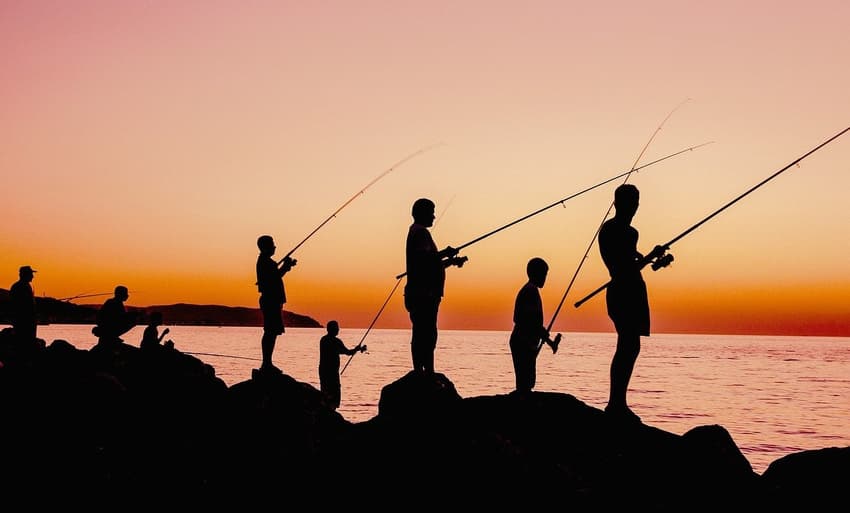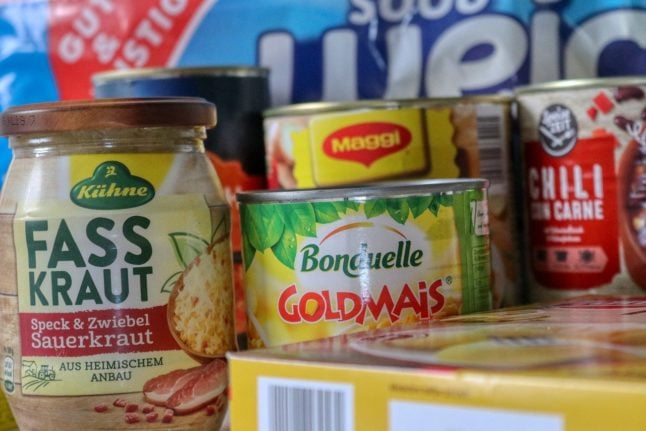Ravioli and guns: What 'war' supplies the Swiss are buying right now

While there is no imminent threat of the war in Ukraine spilling into western Europe, many Swiss consumers are getting ready for just that eventuality. This is what they are stocking up on.
The Swiss like to prepare and be ready for all kinds of disasters, even the most unlikely ones.
One anecdotal example is a (real) person who insisted on keeping a bicycle in his cellar during the Cold War years, in case Russia would invade Switzerland and he would have to flee quickly — although he never specified where he would go or how he would out-pedal Russian tanks.
Everyone thought the guy was a bit eccentric, but now his worries seem less laughable.
Be it as it may, it is not part of the Swiss mentality to be unprepared for all eventualities, as the recent rush for various non-perishable items suggests.
This spirit of preparedness is represented by the ubiquity of bomb shelters, which have come back into ‘vogue’ when the war in Ukraine started.
READ MORE: Ukraine war drives sudden demand for bomb shelters in Switzerland
Many people are also stocking up on non-perishable emergency supplies, according to Watson news platform.
What are the Swiss consumers buying?
Fear of war has sparked the “emergency stocks boom” in Switzerland, Watson reports.
"The need for emergency stock products is definitely noticeable," confirmed Stephan Kurmann, spokesperson for Digitec-Galaxus, an online retailer that is owned by Migros.
As was the case at the beginning of the Covid pandemic, there seems to be another "ravioli frenzy” at Digitec-Galaxus, with other canned goods being in demand as well, due to their durability, Kurmann said.

Canned foods are flying off the virtual shelves. Photo: Pixabay
For instance, sales of ready-to-eat canned meals like ravioli increased by 214 percent since the beginning of the war, followed by non-perishable staples such as sugar (+179 percent), mineral water (+133 percent), and long-life milk (+118 percent) .
Pet food sales on the site also increased by 80 percent.
READ MORE: Chocolate, painkillers and cheese: The emergency pack Switzerland wants you to have
But that’s not all — sales of non-food items also went up significantly.
As the Federal Office for Civil Protection recommends that all households have a battery-operated transistor radio (try to explain what this is to the younger generation), this gadget "had been ordered almost 600 times within a very short time”, Kurmann said.

Note to those under 40: this odd thing is a radio. Photo: Pixabay
Sales of water filters increased by 462 percent, night vision devices by 322 percent, camping stoves and lamps by 295 percent, and fishing equipment by 135 percent. (Kurmann didn’t explain the reason for higher demand for the latter item, so we can only surmise that the Swiss are getting ready to fish in the lakes for their supper when they get sick of eating ravioli).
Kurmann also noted a trend towards increased energy self-sufficiency with more purchases of solar panels, power generators, and flashlights.
Another war-related "shopping spree": increased demand for gun licenses
One thing the Swiss know how to do is use a gun.
READ MORE: EXPLAINED: Understanding Switzerland’s obsession with guns
It is therefore not totally surprising that in some Swiss cities and cantons, requests for weapon licenses have increased by between 50 and 100 percent since Russia invaded Ukraine on February 24th, public broadcaster SRF reported.
Cantons like Zurich and Aargau, for example, have registered “significantly more” applications.
“Specifically, we are talking about an increase of around 50 percent compared to the same period last year”, according to Michael Wirz, police chief of Winterthur, a city in canton Zurich.
While around 80 applications were submitted by mid-April in 2021, the figure was 127 this year, he said.
Comments
See Also
The Swiss like to prepare and be ready for all kinds of disasters, even the most unlikely ones.
One anecdotal example is a (real) person who insisted on keeping a bicycle in his cellar during the Cold War years, in case Russia would invade Switzerland and he would have to flee quickly — although he never specified where he would go or how he would out-pedal Russian tanks.
Everyone thought the guy was a bit eccentric, but now his worries seem less laughable.
Be it as it may, it is not part of the Swiss mentality to be unprepared for all eventualities, as the recent rush for various non-perishable items suggests.
This spirit of preparedness is represented by the ubiquity of bomb shelters, which have come back into ‘vogue’ when the war in Ukraine started.
READ MORE: Ukraine war drives sudden demand for bomb shelters in Switzerland
Many people are also stocking up on non-perishable emergency supplies, according to Watson news platform.
What are the Swiss consumers buying?
Fear of war has sparked the “emergency stocks boom” in Switzerland, Watson reports.
"The need for emergency stock products is definitely noticeable," confirmed Stephan Kurmann, spokesperson for Digitec-Galaxus, an online retailer that is owned by Migros.
As was the case at the beginning of the Covid pandemic, there seems to be another "ravioli frenzy” at Digitec-Galaxus, with other canned goods being in demand as well, due to their durability, Kurmann said.

Canned foods are flying off the virtual shelves. Photo: Pixabay
For instance, sales of ready-to-eat canned meals like ravioli increased by 214 percent since the beginning of the war, followed by non-perishable staples such as sugar (+179 percent), mineral water (+133 percent), and long-life milk (+118 percent) .
Pet food sales on the site also increased by 80 percent.
READ MORE: Chocolate, painkillers and cheese: The emergency pack Switzerland wants you to have
But that’s not all — sales of non-food items also went up significantly.
As the Federal Office for Civil Protection recommends that all households have a battery-operated transistor radio (try to explain what this is to the younger generation), this gadget "had been ordered almost 600 times within a very short time”, Kurmann said.

Note to those under 40: this odd thing is a radio. Photo: Pixabay
Sales of water filters increased by 462 percent, night vision devices by 322 percent, camping stoves and lamps by 295 percent, and fishing equipment by 135 percent. (Kurmann didn’t explain the reason for higher demand for the latter item, so we can only surmise that the Swiss are getting ready to fish in the lakes for their supper when they get sick of eating ravioli).
Kurmann also noted a trend towards increased energy self-sufficiency with more purchases of solar panels, power generators, and flashlights.
Another war-related "shopping spree": increased demand for gun licenses
One thing the Swiss know how to do is use a gun.
READ MORE: EXPLAINED: Understanding Switzerland’s obsession with guns
It is therefore not totally surprising that in some Swiss cities and cantons, requests for weapon licenses have increased by between 50 and 100 percent since Russia invaded Ukraine on February 24th, public broadcaster SRF reported.
Cantons like Zurich and Aargau, for example, have registered “significantly more” applications.
“Specifically, we are talking about an increase of around 50 percent compared to the same period last year”, according to Michael Wirz, police chief of Winterthur, a city in canton Zurich.
While around 80 applications were submitted by mid-April in 2021, the figure was 127 this year, he said.
Join the conversation in our comments section below. Share your own views and experience and if you have a question or suggestion for our journalists then email us at [email protected].
Please keep comments civil, constructive and on topic – and make sure to read our terms of use before getting involved.
Please log in here to leave a comment.